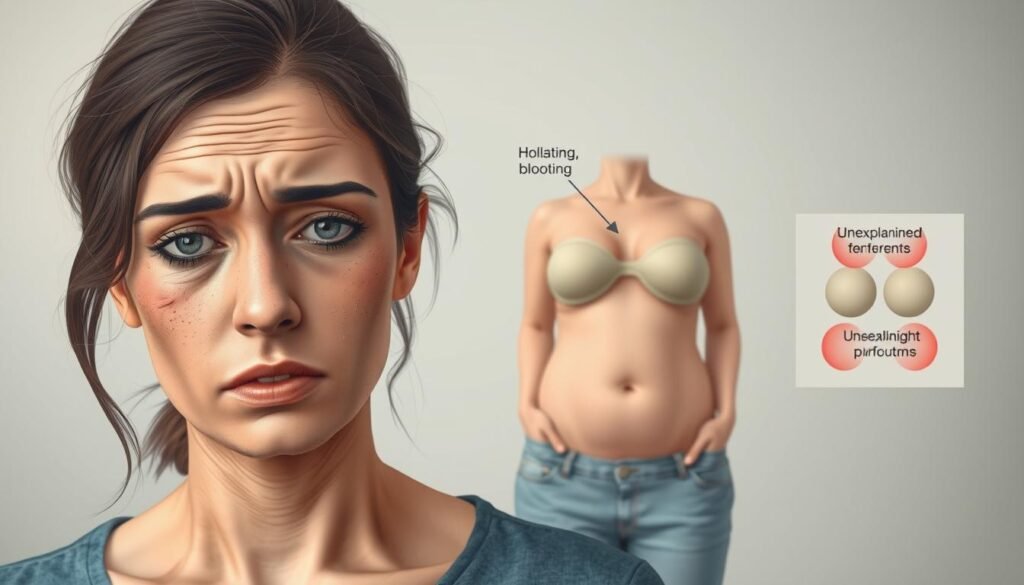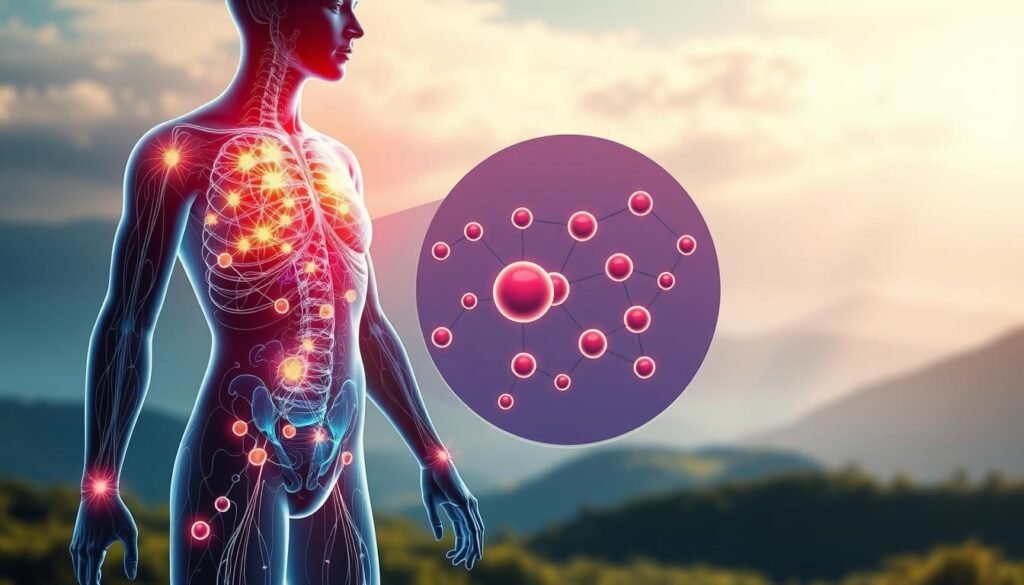7 Signs You Need Hormonal Balance (And What To Do)

Feeling off? It could be due to hormonal imbalance symptoms affecting your daily life. Hormones play a crucial role in regulating various bodily functions, from energy levels to mood.
When hormones are out of balance, it can impact nearly every aspect of your well-being. Recognizing the signs of hormone imbalance is the first step toward reclaiming your health and feeling your best again.
Understanding the importance of hormonal balance is key to addressing the root causes of discomfort and fatigue. This article will guide you through the indicators of hormonal imbalance and provide insights into restoring balance.
Key Takeaways
- Identify common symptoms of hormonal imbalance.
- Understand the impact of hormonal imbalance on overall health.
- Learn simple steps to restore hormonal balance.
- Discover lifestyle changes that support hormone health.
- Explore natural remedies for alleviating hormone imbalance.
Understanding Hormonal Imbalance
The human body relies on a delicate balance of hormones to function properly, and any disruption can lead to significant health issues. Hormones are chemical messengers produced by the endocrine glands, playing a crucial role in regulating various bodily functions, including growth, metabolism, and reproductive processes.
What Are Hormones and Why They Matter
Hormones are essential for maintaining homeostasis, the body’s internal balance. They influence mood, energy levels, and overall well-being. For instance, thyroid hormones regulate metabolism, while insulin controls blood sugar levels. Understanding the role of hormones is vital for identifying and addressing hormonal imbalances.
The endocrine system, a network of glands and organs, produces hormones. Key endocrine glands include the pituitary, thyroid, adrenal glands, pancreas, and gonads (ovaries and testes). Each gland produces specific hormones that have unique functions in the body.
Common Causes of Hormonal Imbalance
Hormonal imbalance can result from various factors. Age and puberty are natural life stages that can cause hormonal fluctuations. Additionally, certain medical conditions, such as polycystic ovary syndrome (PCOS), thyroid disorders, and diabetes, can disrupt hormonal balance.
Other factors contributing to hormonal imbalance include lifestyle factors, such as diet and stress. Consuming a diet high in processed foods and sugar can lead to insulin resistance, a precursor to diabetes. Chronic stress can affect the adrenal glands, leading to imbalances in cortisol and other hormones.
How Hormones Affect Your Overall Health
Hormones play a crucial role in maintaining our overall health, influencing everything from growth and metabolism to reproductive processes. The endocrine system, a network of glands that produce hormones, is vital for regulating various bodily functions.

The Endocrine System Explained
The endocrine system is a complex network that includes glands such as the pituitary, thyroid, adrenal glands, pancreas, and reproductive organs. These glands produce and secrete hormones directly into the bloodstream, where they travel to reach their target cells.
The Role of the Endocrine System: It regulates growth, metabolism, and reproductive processes, among other functions. An imbalance in the endocrine system can lead to various health issues, including hormone imbalance symptoms.
Key Hormones and Their Functions
Several key hormones play significant roles in our health:
- Insulin: Regulates blood sugar levels.
- Thyroid Hormones: Influence metabolism and energy levels.
- Adrenaline: Prepares the body for ‘fight or flight’ responses.
- Estrogen and Progesterone: Crucial for reproductive health in women.
- Testosterone: Important for reproductive health in men.
| Hormone | Function | Impact of Imbalance |
|---|---|---|
| Insulin | Regulates blood sugar | Diabetes or hypoglycemia |
| Thyroid Hormones | Influences metabolism | Weight changes, fatigue |
| Adrenaline | Prepares body for stress | Anxiety, stress responses |
“Hormonal balance is crucial for overall health. An imbalance can lead to a variety of symptoms, including fatigue, weight changes, and mood swings.”
Understanding the endocrine system and the role of key hormones can help individuals identify potential hormonal imbalance remedies. Maintaining hormonal health is essential for overall well-being.
Sign #1: Persistent Fatigue and Low Energy
Feeling constantly tired can be more than just a sign of a busy life; it might be your body’s way of signaling a hormonal imbalance. Hormones play a crucial role in regulating various bodily functions, including energy levels.
How Hormones Regulate Energy Levels
Hormones such as thyroid hormones and cortisol are key regulators of energy. Thyroid hormones, produced by the thyroid gland, influence metabolism, which directly affects energy levels. Cortisol, often referred to as the “stress hormone,” is produced by the adrenal glands and helps the body respond to stress. It also plays a role in the regulation of energy by influencing the metabolism of carbohydrates, fats, and proteins.
Thyroid Hormones: These hormones are essential for the production of energy in cells. A deficiency, known as hypothyroidism, can lead to feelings of fatigue and low energy.
Cortisol: While cortisol is vital for responding to stress, chronically elevated levels can disrupt the body’s natural energy rhythms, leading to fatigue.
| Hormone | Function | Impact on Energy |
|---|---|---|
| Thyroid Hormones | Regulate Metabolism | Influence energy production |
| Cortisol | Responds to Stress | Affects energy rhythms |
When Fatigue Signals Hormonal Issues
Fatigue can be a symptom of hormonal imbalance when it’s persistent and not relieved by rest. If you’re experiencing ongoing tiredness that interferes with your daily activities, it might be related to a hormonal issue.
What To Do About Hormone-Related Fatigue
Addressing hormone-related fatigue involves identifying and treating the underlying hormonal imbalance. This might include medical treatments, lifestyle changes, or a combination of both.
- Get enough sleep and maintain a consistent sleep schedule.
- Engage in regular physical activity to boost energy levels.
- Manage stress through techniques like meditation or yoga.
- Consult with a healthcare provider to check for hormonal imbalances.
By understanding the role of hormones in energy regulation and taking steps to address imbalances, you can work towards restoring your energy levels and overall well-being.
Sign #2: Unexplained Weight Changes
Unexplained weight changes can be a jarring experience, often signaling an underlying hormonal imbalance. Hormones play a crucial role in regulating metabolism, appetite, and body weight. When there’s an imbalance, it can lead to unexpected weight gain or loss.
Hormones That Control Metabolism
Several key hormones are involved in controlling metabolism and, by extension, body weight. These include:
- Insulin: Regulates blood sugar levels and fat storage.
- Cortisol: Often referred to as the “stress hormone,” it can influence fat distribution and metabolism.
- Thyroid Hormones: Directly impact metabolic rate, influencing how the body uses energy.
Weight Gain vs. Weight Loss as Symptoms
Both unexplained weight gain and loss can be symptoms of hormonal imbalance. For instance, an underactive thyroid gland (hypothyroidism) can lead to weight gain due to a decreased metabolic rate. Conversely, an overactive thyroid (hyperthyroidism) can cause weight loss because of an increased metabolic rate.
Weight changes due to hormonal imbalances are not just about the number on the scale; they can also involve changes in body composition, such as increased fat around the midsection, which is often associated with cortisol imbalances.
Balancing Hormones for Healthy Weight
To achieve and maintain a healthy weight, it’s essential to balance the hormones that control metabolism. Here are some strategies:
- Dietary Changes: Focus on a balanced diet rich in whole foods, fiber, and lean proteins to support hormonal health.
- Regular Exercise: Engage in a mix of cardio, strength training, and flexibility exercises to boost metabolism and overall health.
- Stress Management: Practice stress-reducing techniques like meditation or yoga to help control cortisol levels.
- Adequate Sleep: Ensure you get enough sleep each night, as poor sleep can disrupt hormone levels.
By addressing hormonal imbalances and adopting a healthy lifestyle, individuals can better manage their weight and improve overall well-being.
Sign #3: Mood Swings and Mental Health Changes
The connection between hormones and mood is complex, and imbalances can lead to significant mental health changes. Hormones such as estrogen and progesterone play a crucial role in regulating mood, and any disruption in their balance can result in mood swings, depression, and anxiety.

The Hormone-Mood Connection
Hormones influence neurotransmitters in the brain, which are chemicals that help regulate mood. For instance, estrogen is known to affect serotonin levels, a neurotransmitter that helps reduce symptoms of depression. When estrogen levels drop, it can lead to lower serotonin levels, potentially causing or exacerbating depressive symptoms.
Progesterone, another key hormone, can have a calming effect on the nervous system. However, fluctuations in progesterone levels can lead to anxiety and irritability. Understanding this intricate balance is crucial for addressing mood-related symptoms.
Depression, Anxiety, and Irritability as Warning Signs
Mood swings, depression, anxiety, and irritability can be warning signs of hormonal imbalance. These symptoms can manifest differently in different people. For some, it might be persistent feelings of sadness or hopelessness, while for others, it could be sudden irritability or anxiety attacks.
Recognizing these symptoms as potential indicators of hormonal imbalance is the first step towards seeking appropriate help. It’s essential to consult with a healthcare provider to determine if hormonal imbalance is the underlying cause of these mental health changes.
Stabilizing Mood Through Hormone Balance
Restoring hormone balance can significantly improve mood and overall mental health. This can involve various approaches, including lifestyle changes, dietary adjustments, and in some cases, hormone therapy.
Key strategies for stabilizing mood include:
- Eating a balanced diet rich in nutrients that support hormone production
- Engaging in regular exercise to reduce stress and improve mood
- Practicing stress management techniques such as meditation or yoga
- Considering supplements or herbs that support hormonal health, under the guidance of a healthcare provider
By addressing hormonal imbalance and adopting a holistic approach to health, individuals can work towards stabilizing their mood and improving their mental well-being.
Sign #4: Sleep Disturbances
One of the critical signs of hormonal imbalance is sleep disturbances, which can severely impact daily life. Sleep plays a crucial role in overall health, and hormonal changes can significantly affect sleep quality.
Regulation of Sleep Cycles by Hormones
Hormones such as melatonin and cortisol play a vital role in regulating sleep cycles. Melatonin, often referred to as the “sleep hormone,” helps induce sleep, while cortisol, known as the “stress hormone,” can interfere with sleep when its levels are elevated at night.
Melatonin levels typically rise in the evening, promoting sleep, and decrease in the morning, allowing wakefulness. Cortisol, on the other hand, follows a different pattern, peaking in the morning to help wake up and decreasing at night to allow sleep.
Sleep Problems Related to Hormonal Imbalance
Hormonal imbalance can lead to various sleep problems, including insomnia, sleep apnea, and restless leg syndrome. Insomnia, characterized by difficulty falling or staying asleep, is a common complaint among individuals with hormonal imbalances.
| Hormone | Role in Sleep | Effect of Imbalance |
|---|---|---|
| Melatonin | Regulates sleep-wake cycle | Reduced melatonin can cause insomnia |
| Cortisol | Stress response | Elevated cortisol at night can disrupt sleep |
| Thyroid Hormones | Regulate metabolism | Imbalance can lead to sleep disturbances |
Improving Sleep Through Hormonal Health
Addressing hormonal imbalance is crucial for improving sleep. This can involve lifestyle changes, dietary adjustments, and in some cases, medical treatment.
- Establish a consistent sleep schedule to regulate melatonin production.
- Create a sleep-conducive environment, such as keeping the bedroom cool and dark.
- Avoid stimulating activities before bedtime to reduce cortisol levels.
By understanding the link between hormones and sleep, individuals can take steps to improve their sleep quality and overall health.
Sign #5: Skin and Hair Changes
Hormonal fluctuations can significantly impact the health and appearance of your skin and hair. When hormones are out of balance, it can lead to a variety of skin and hair issues.
Hormonal Impact on Skin Health
Hormones play a crucial role in maintaining skin health. An imbalance can cause skin problems such as acne, dryness, or oiliness. For instance, an excess of androgens can lead to acne, while a lack of estrogen can cause dry skin.
Common skin issues due to hormonal imbalance include:
- Acne
- Dry or oily skin
- Skin discoloration

Hair Loss and Other Hair-Related Symptoms
Hormonal changes can also affect hair growth and health. Common issues include hair loss, thinning, or excessive hair growth in unwanted areas (hirsutism).
Symptoms of hormonal hair changes:
- Hair loss or thinning
- Excessive hair growth
- Changes in hair texture
Restoring Skin and Hair Health
Restoring hormonal balance is key to improving skin and hair health. This can involve dietary changes, stress management, and in some cases, medical treatment.
Steps to restore skin and hair health:
- Maintain a balanced diet rich in vitamins and minerals
- Manage stress through exercise or meditation
- Consider hormonal testing and treatment if necessary
Sign #6: Digestive Issues
The intricate relationship between hormones and digestive health is often overlooked until symptoms arise. Hormones play a crucial role in regulating various bodily functions, including digestion.
The Gut-Hormone Connection
The gut and hormonal system are closely intertwined. Hormones can affect the motility of the digestive tract, the secretion of digestive enzymes, and the absorption of nutrients. Conversely, the health of the gut can influence hormone production and balance.
“A healthy gut is essential for maintaining hormonal balance.” This connection highlights the importance of considering digestive health when addressing hormonal imbalances.
Common Digestive Symptoms of Hormonal Imbalance
Hormonal imbalances can lead to a variety of digestive issues, including:
- Constipation
- Diarrhea
- Irritable Bowel Syndrome (IBS)
- Bloating and gas
These symptoms can significantly impact quality of life, making it essential to address the underlying hormonal issues.
Supporting Gut Health for Hormone Balance
Improving gut health can help restore hormonal balance. This can be achieved through:
- Dietary changes, such as increasing fiber intake and consuming probiotic-rich foods
- Managing stress through techniques like meditation or yoga
- Avoiding foods that can disrupt gut health, such as those high in sugar or processed ingredients
By supporting gut health, individuals can take a significant step towards achieving hormonal balance and overall well-being.
“The gut is often referred to as the ‘second brain’ due to its significant influence on overall health, including hormonal balance.”
Sign #7: Reproductive and Sexual Health Issues
When hormonal balance is disrupted, it can lead to significant reproductive and sexual health problems. Hormones play a crucial role in regulating various bodily functions, including reproductive processes. An imbalance can manifest in different ways, affecting both men and women.
Menstrual Irregularities in Women
One of the most common signs of hormonal imbalance in women is menstrual irregularities. This can include irregular periods, heavy or light bleeding, and painful cramps. Hormonal fluctuations, particularly with estrogen and progesterone, can disrupt the normal menstrual cycle.
The table below summarizes common menstrual irregularities associated with hormonal imbalance:
| Symptom | Description | Possible Hormonal Cause |
|---|---|---|
| Irregular Periods | Infrequent or unpredictable menstrual cycles | Estrogen and Progesterone Imbalance |
| Heavy Bleeding | Excessive menstrual bleeding | Estrogen Dominance |
| Painful Cramps | Severe menstrual cramps | Prostaglandins and Hormonal Changes |
Libido Changes and Sexual Dysfunction
Hormonal imbalance can also affect libido and sexual function. Low testosterone levels can lead to decreased libido in both men and women, while estrogen imbalance can cause vaginal dryness and discomfort during sex.
Addressing libido changes and sexual dysfunction requires a comprehensive approach that includes hormonal evaluation and balance.
Addressing Reproductive Health Concerns
To address reproductive health concerns related to hormonal imbalance, it’s essential to consult a healthcare provider. They can help determine the underlying cause of the imbalance and recommend appropriate treatments.
Diagnostic tests may include hormone level checks, and treatment options can range from lifestyle changes to hormone therapy.
7 Signs You Need Hormonal Balance (And What To Do) – Testing Options
Diagnosing hormonal imbalance requires accurate testing, which can be done at home or in a medical setting. Understanding your hormone levels is crucial for determining the best course of action to restore balance and alleviate symptoms.
At-Home Hormone Testing
At-home hormone testing kits have become increasingly popular for their convenience and privacy. These kits usually require a saliva, blood, or urine sample, which is then sent to a laboratory for analysis.
Pros of at-home testing:
- Convenience and comfort of testing from home
- Potential cost savings compared to medical visits
- Quick results
Cons of at-home testing:
- Accuracy can vary depending on the kit and laboratory
- Limited scope of tests available
- No professional interpretation of results
| Testing Method | Sample Required | Accuracy Level |
|---|---|---|
| Saliva Test | Saliva Sample | Moderate |
| Blood Test | Blood Sample | High |
| Urine Test | Urine Sample | Moderate to High |
Professional Medical Testing
Professional medical testing involves consulting a healthcare provider who can order specific tests based on your symptoms and medical history. These tests can include blood tests, thyroid function tests, or other hormone level assessments.
Benefits of professional medical testing:
- Accurate diagnosis through comprehensive testing
- Professional interpretation of test results
- Personalized treatment plans
When choosing between at-home hormone testing and professional medical testing, consider your specific needs, the severity of your symptoms, and your comfort level with the testing process. For many, a combination of both, starting with at-home testing and following up with professional medical evaluation, provides the most comprehensive approach to diagnosing and treating hormonal imbalance.
Natural Approaches to Restore Hormonal Balance
Hormonal imbalance can be addressed through various natural approaches that promote overall well-being. By incorporating simple lifestyle changes, individuals can significantly improve their hormonal health.
Dietary Changes for Hormone Health
Diet plays a crucial role in maintaining hormonal balance. Consuming a diet rich in whole foods, such as fruits, vegetables, and lean proteins, can help support hormone production and regulation. Foods high in omega-3 fatty acids, like salmon and walnuts, are particularly beneficial as they reduce inflammation and promote hormonal health.
Avoiding processed foods and sugars is equally important, as they can disrupt hormone levels and lead to imbalances. Including fiber-rich foods like broccoli and berries can aid in detoxifying excess hormones, further supporting hormonal balance.
| Food Group | Beneficial Foods | Hormonal Benefit |
|---|---|---|
| Fruits and Vegetables | Broccoli, Berries | Detoxifies excess hormones |
| Proteins | Lean Meats, Fish | Supports hormone production |
| Nuts and Seeds | Walnuts, Chia Seeds | Reduces inflammation |
Exercise and Stress Management
Regular exercise is another critical component in restoring hormonal balance. Physical activity helps regulate insulin levels and improves thyroid function, both of which are essential for hormonal health. Activities like yoga and walking are particularly beneficial as they also reduce stress.
Stress management is vital because chronic stress can disrupt the body’s natural hormonal balance. Techniques such as meditation and deep breathing exercises can help mitigate stress, promoting a healthier hormonal environment.
Supplements and Herbs for Hormonal Support
Certain supplements and herbs can provide additional support for hormonal balance. Probiotics, for instance, support gut health, which is closely linked to hormonal regulation. Other beneficial supplements include vitamin D and omega-3 fatty acids.
Herbs like maca and ashwagandha are known for their hormone-balancing properties. Maca, in particular, is believed to support adrenal function and improve energy levels, while ashwagandha helps reduce stress and anxiety.
- Probiotics: Supports gut health
- Vitamin D: Essential for overall health
- Omega-3 Fatty Acids: Reduces inflammation
- Maca: Supports adrenal function
- Ashwagandha: Reduces stress and anxiety
By incorporating these natural approaches into daily life, individuals can take significant steps towards restoring hormonal balance and improving their overall health and well-being.
When to Seek Medical Help for Hormonal Imbalance
If you’re experiencing persistent symptoms of hormonal imbalance, it’s essential to know when to consult a healthcare professional. Hormonal imbalance can manifest in various ways, and while some symptoms can be managed through lifestyle changes, others may require medical intervention.
Medical Treatments for Hormone Imbalance
Medical treatments for hormonal imbalance are designed to restore balance to the endocrine system. One common treatment is hormone replacement therapy (HRT), which involves supplementing the body with hormones that are not being produced in sufficient quantities.
- Bioidentical Hormone Replacement Therapy (BHRT): Uses hormones that are identical in molecular structure to the hormones produced by the body.
- Thyroid Hormone Replacement: For individuals with hypothyroidism, this treatment helps restore normal thyroid function.
- Cortisol Management: For those with adrenal insufficiency, managing cortisol levels is crucial.
These treatments should be undertaken under the guidance of a qualified healthcare provider to ensure they are used safely and effectively.
Finding the Right Healthcare Provider
Finding a healthcare provider who is knowledgeable about hormonal imbalance is crucial for effective treatment. Here are some tips to help you find the right professional:
- Check Credentials: Ensure the healthcare provider is board-certified and has experience in endocrinology or a related field.
- Read Reviews: Patient reviews can provide insight into a provider’s bedside manner and effectiveness.
- Ask Questions: During your initial consultation, ask about their approach to treating hormonal imbalance and what you can expect from treatment.
As noted by the American Thyroid Association, “The diagnosis and treatment of thyroid disease require a comprehensive approach that includes clinical evaluation, laboratory testing, and sometimes imaging studies.”
“The key to successful treatment of hormonal imbalance lies in a comprehensive understanding of the individual’s condition and a tailored approach to care.”
Conclusion
Recognizing the 7 signs you need hormonal balance is crucial for maintaining overall health. Hormonal imbalance can manifest in various ways, from persistent fatigue and unexplained weight changes to mood swings and sleep disturbances. By understanding the causes and symptoms of hormone imbalance, individuals can take proactive steps towards achieving hormonal health.
Restoring balance to hormonal health requires a comprehensive approach that includes dietary changes, stress management, and, if necessary, medical intervention. By being aware of hormone imbalance symptoms and taking action, individuals can improve their overall wellbeing and quality of life.
Empowered with the knowledge of the 7 signs you need hormonal balance, individuals can now take control of their hormonal health and make informed decisions about their wellbeing.
What do you think?
Show comments / Leave a comment